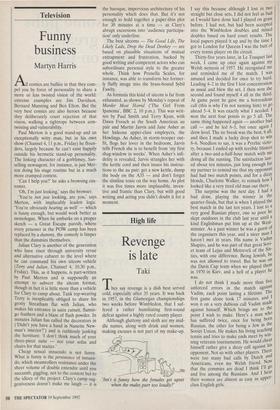High life
Revenge is late
Taki
They say revenge is a dish best served cold, especially after 35 years. It was back in 1957, in the Glamorgan championships two weeks before Wimbledon, that I suf- fered a rather humiliating first-round defeat against a highly rated county player.
Although gluttony and sloth are my mid- dle names, along with drink and women, making excuses is not part of my make-up.
'Isn't it funny how the females get upset when the males purr too loudly?'
I say this because although I lost in two straight but close sets, I did not feel as bad as I would have done had I played on grass before. I had not, but had been accepted into the Wimbledon doubles and mixed doubles based on hard court results. The local papers played it up and by the time I got to London for Queens I was the butt of every tennis player on the circuit. Thirty-five years later, in Le Touquet last week, I came up once again against my Welsh nemesis of 1957. He recognised me and reminded me of the match. I was amused and decided for once to try hard. Leading 4-2 in the first I lost concentration as usual and blew the set. I then won the second and .found myself 4 all in the third. At game point he gave me a horrendous call (this is why I'm not naming him) to go ahead 5-4. It was exactly what I needed. I won the next four points to go 5 all. The same thing happened again — another bad call — and he led 6-5, but once again I drew level. The tie break was the best, 6 all, and then I made a lucky drop shot to win 8-6. Needless to say, it was a Pyrrhic victo- ry, because I ended up with terrible blisters after a two-and-a-half-hour match with me doing all the running. The satisfaction last- ed about ten minutes, just long enough for my partner to remind me that my opponent had had two match points, and for a dizzy blonde, Charlotte Walker, to remark how I looked like a very tired old man out there.
The surprise was the next day. I had a bad draw, playing the winner in the quarter-finals, but that is when I played the best match in the last ten years. I lost to a very good Russian player, one so poor he slept outdoors in the club last year until a kind Englishman put him up at the West- minster. As a past winner he was a guest of the organisers this year, and a nicer man I haven't met in years. His name is Vadim Shapiro, and he was part of that great Sovi- et team of Lejus and Metreveli of the Six- ties, with one difference. Being Jewish, he was not allowed to travel. But he was on the Davis Cup team when we played them in 1970 in Kiev, and a hell of a player he was.
I do not think I made more than five unforced errors in the match against Vadim, each point lasting a lifetime. The first game alone took 17 minutes, and I won it on a very dubious call Vadim made against himself. Which brings me to the point I wish to make. Here's a man wh° has suffered twice, once for being born Russian, the other for being a Jew in the Soviet Union. He makes his living teaching tennis and tries to make ends meet by win- ning veterans tournaments. He would cheat himself rather give a dicey call against his opponent. Not so with other players. There were too many bad calls by Dutch and Americans, even my Welsh friend. NOW that the commies are dead I think Ill 8° and live among the Russians. And I hear their women are almost as easy as upper- class English girls.


























































 Previous page
Previous page